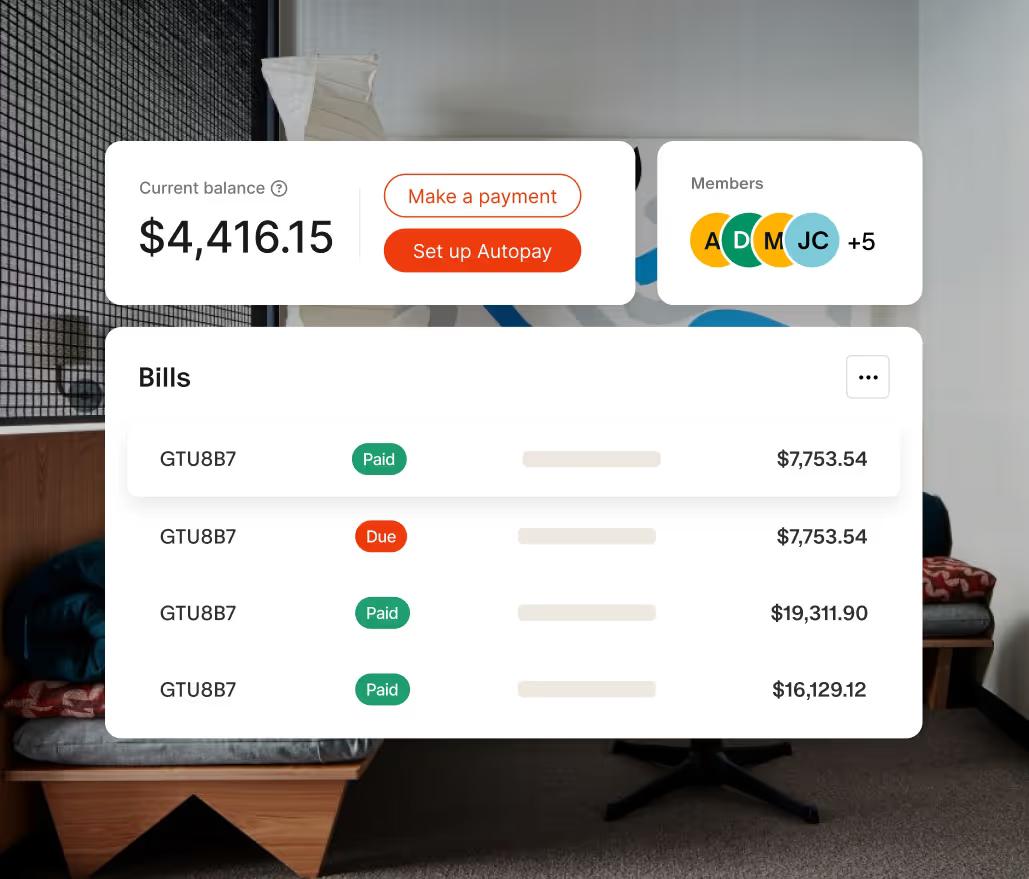How Construction Teams Eliminate Receipt Chaos Across Departments (And See Total Travel Costs)

It’s month-end again. Finance is chasing receipts from subs who are already on the next job. Operations is getting calls asking, "Where are my crews staying?" Project Managers are scrambling to explain budget overruns they didn't see coming.
When three departments fight the same problem differently, everyone loses. Projects that looked profitable suddenly aren't when travel costs show up weeks late. Finance is closing the books days behind schedule.
Construction companies that get rid of this expense management mess protect their profits, close books faster, and base decisions on complete data instead of just fragments scattered across a bunch of card statements.
Why Receipt Chaos Hits Every Department Differently
Receipt chaos breaks three departments in three different ways because each department has a different job to do. Finance needs accurate cost allocation to close books and prove compliance. Operations needs real-time crew visibility to coordinate logistics and keep jobs moving. Project Management needs budget control to protect margins and make decisions before money disappears.
The same missing receipt stops Finance from closing the month, leaves Operations unable to answer "where's my crew?" and keeps PM from knowing if the Chicago job is already 20% over budget. Each department wastes hours solving their piece of the problem while the others drown in theirs.
Finance's Receipt Nightmare
Finance lives by one rule: every dollar needs a job code. Without receipts, they can't allocate costs to the right project. That means profitability reports lie, auditors reject documentation, and month-end close stalls while everyone waits for paperwork from contractors who are already three states away on the next job.
Finance is chasing independent contractor and subcontractor receipts monthly, manually trying to guess which job code goes with which charge. Missing paperwork from Ops stalls the month-end close for days. Meanwhile, contractors are waiting weeks for their money; cash that could be on a new job is frozen waiting for reimbursement.
Without consolidated cost control, Finance wastes 8+ hours monthly just hunting receipts. Miss three receipts and your profit reports are wrong. Now big decisions are based on bad data.
Operations' Coordination Crisis
Operations keeps jobs running by knowing where every crew is and getting them where they need to be next. When travel bookings live in scattered inboxes and contractor credit card statements, Ops has no visibility. They can't answer basic questions from PMs, can't coordinate equipment deliveries to the right hotel, and can't plan crew rotations because they don't know who's staying where.
Project managers call daily: "Where is my electrical crew for Atlanta?" Ops has no idea what's been booked or how much it costs. Bookings get delayed waiting for Finance to approve contractor credit cards. Independent contractors and subcontractors complain about paying for rooms themselves and waiting weeks to get paid back.
Ops spends hours weekly answering those location questions and dealing with payment complaints. That's time stolen from actual logistics: coordinating equipment, managing site access, and keeping jobs on schedule.
Project Management's Budget Black Hole
Project managers protect margins by making decisions before money disappears. Should they extend the Seattle crew another week or fly them home? Can they absorb the weather delay in Chicago or need to bill the client? These decisions require knowing exactly where the budget stands right now, not 30 days from now when Finance finally closes the books.
Travel eats 5–15% of a project budget, but you don't see the cost hit until Finance closes the books, usually weeks too late to fix anything. Without real-time costs, comparing the Seattle job to the Austin build is just a guess. Budget decisions become a gamble instead of a data-driven call.
Surprise overruns hurt your credibility with clients. That $12,000 hotel overrun shows up too late when you can't change the labor schedules or client expectations. Project managers lose control of their most unpredictable expense when they need visibility the most.
How to Calculate the Real Cost of Receipt Chaos
Add up the hours each department spends untangling the same stack of receipts and multiply by their hourly rate. That's your hidden administrative burden. Real money leaking out of every job before the first invoice even goes out.
For a mid-size contractor with 50 traveling crew members, that's 30+ hours monthly, equivalent to hiring someone part-time just to manage travel chaos.
Direct Bill Ends the Receipt Chase
Scattered payment methods are the reason Finance chases receipts every month. With Direct Bill, one monthly invoice replaces the entire paper trail. No contractor credit cards, IOU reimbursements, or missing hotel slips.
What Finance Gets
One consolidated monthly invoice replaces loads of individual receipts. Cash stays in the company instead of tied up in contractor advances. Automatic documentation satisfies audit requirements without calling the crew for paperwork.
Direct billing cuts reconciliation time significantly. It gives cleaner financial statements, and the ability to spot budget problems while you can still fix them. Profitability reports include the full travel cost from day one.
What Operations Gets
Instant booking means no waiting on Finance for credit card approvals. Real-time crew visibility answers project manager questions immediately. With Engine's incidental coverage option, independent contractors and subcontractors walk into hotels without presenting credit cards at check-in.
Engine builds this right into the booking flow. When Ops books a room, Finance sees the charge, and PM sees the cost hit the budget, all in real time. No extra steps. No coordination meetings.
Ops managers used to field constant "where are they staying?" calls. Now they can check the dashboard and answer instantly.
What Project Managers Get
Cost visibility goes from 30-day lag to same-day updates. If the Chicago high-rise is hitting 75% of its hotel budget halfway through the job, you know it before it turns into an awkward conversation with the client. Real-time visibility keeps surprises out of progress meetings and protects the profit you fought for.
Without Engine, you'd discover 120% overruns at month-end with no time to adjust labor schedules or client expectations. Now you catch budget drift while you can still do something about it.
Get One Booking, Three Views, Plus Custom Fields
When Finance tags a booking with job code #2401, Operations sees it. When Operations assigns foreman Rodriguez, Project Management sees it.
When PM flags a budget at 75%, everyone sees it. Custom fields make that happen automatically. Set it up once with all three departments, and every booking captures the data everyone needs.
Finance's Accounting Requirements
Job code tagging at booking automatically allocates costs to correct projects. GL code integration matches your chart of accounts (Jonas, Sage, Viewpoint). Cost center assignment keeps overhead separate from project expenses.
Engine custom fields follow bookings through invoicing. When Finance exports data, every charge already includes job code, GL code, and cost center, preventing allocation errors.
Operations' Coordination Needs
Crew tags track electrical, GC, and specialty trades separately. Site location codes show which job site the rooms support. Foreman assignment creates accountability. Ops filters dashboards by crew or site to answer PM questions instantly.
Project Management's Budget Tracking
Project phase tagging tracks costs by timeline (foundation, framing, finishing). Client codes separate billable from non-billable expenses. Budget categories show accommodation vs. per diem limits.
Real-time profit reports include travel costs from day one. PMs see exactly what the Atlanta warehouse electrical phase cost compared to budget, compared to the Seattle job, and compared to past data.
The Shared Benefit
When a crew books the Dallas distribution center HVAC work, Finance sees job code #3105-Dallas, GL code 5100-Travel. Operations sees HVAC crew, Dallas site, foreman Chen. Project Management sees Dallas budget, Phase 2 mechanical, 12% of accommodation budget used.
One booking. Three views. Zero coordination required.
Set up those custom fields once with all three departments. Engine embeds those requirements right into the booking flow so every room automatically captures the complete data.
See Total Travel Costs in Real Time with Automated Reporting
Delaying information is what turns a receipt problem into a budget disaster. Now, every department gets their view of the same complete data set without waiting for the month-end cleanup.
Finance's Reports
Finance lives by clean allocation. Automated reporting pushes every hotel slip into one invoice, already tagged with job codes and GL accounts. You open the dashboard and see every charge (lodging, taxes, fees) lined up and ready to export.
When auditors knock, the folio, traveler name, and project code are already attached. Month-end close shrinks from days of manual reconciliation to a quick review and export.
Operations' Reports
Active crew dashboard provides real-time view of where crews are staying across active job sites. The calendar gives you a look ahead for coordination. You can see which subcontractors travel the most.
Project Management's Reports
Project cost summaries show total travel spend by job site versus the budget. You can compare if costs in the Northeast are higher than the Southwest. Budget burn rates track daily spend by project phase.
Cross-Departmental Reporting
Schedule automated reports for each department:
- Finance: Monthly full cost export (first business day)
- Operations: Weekly crew location summary (every Monday)
- Project Management: Daily budget alerts (at 75% of accommodation budget)
Role-based dashboard views mean Finance sees accounting codes, Ops sees the locations, and PM sees the budget percentages; all looking at the same clean booking data.
Departments used to waste hours cleaning up the same data to get different answers. Now they get different views of complete data instantly.
From Receipt Chaos to Control with Engine
Construction companies can set up direct billing, custom fields, and automated reporting in 4 weeks. Every month spent in receipt chaos is costing you real money in admin time and bad budget decisions.
- Week 1: Set up custom fields with input from everyone. Finance gives job codes, Ops gives crew tags, PM gives budget categories.
- Week 2: Train each department on their dashboard view. Finance learns how to reconcile. Ops learns how to track crews. PM learns how to monitor the budget. Training takes 30 minutes per department.
- Week 3: Go live with one test project. Run daily reports to catch any tagging errors or gaps in the process.
- Week 4: Review cross-departmental results. Finance measures how much time they saved on reconciliation. Ops tracks how much coordination time they got back. PM confirms the budget accuracy improved.
Once you’ve got all that nailed down, set up Direct Bill. You get one monthly statement tagged by construction project, crew, and budget line item— for an even faster month-end. It’s complete visibility into travel expenses across Finance, Operations, and Project Management.
Ready to kill the receipt chaos? Book a demo to see how construction teams get full travel expense control in under 30 days.

FAQs
How does Direct Bill work if crews book their own rooms?
Crews book rooms through Engine without providing a payment card during checkout. With incidental coverage enabled, they also walk into hotels without presenting a card at check-in. Engine charges your company account directly and consolidates all bookings into one monthly invoice, regardless of who made the reservation.
Can we still use Direct Bill if our contractors work for multiple companies at the same time?
Yes. Custom fields let you tag each booking to the specific company or client project at check-out. This ensures the charges go to the right place, even if the same contractor is working on different jobs for different clients.
What happens if a crew member books outside our travel policy limits?
Engine's travel policy controls stop out-of-policy bookings at checkout unless you enable "book outside policy" with required justification. Any exception booking flags automatically in your dashboard for immediate review before the charge posts.













.avif)







.avif)






